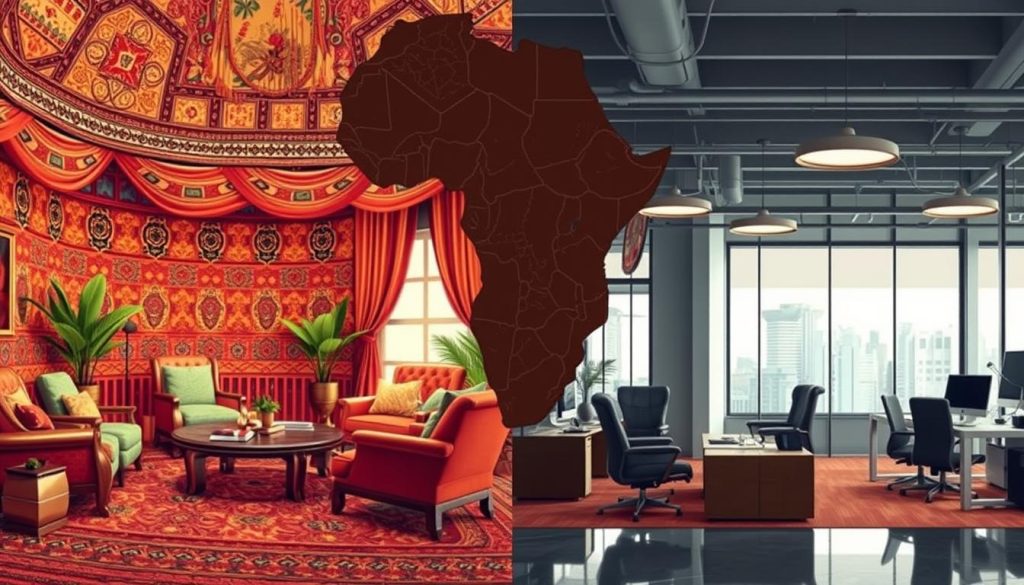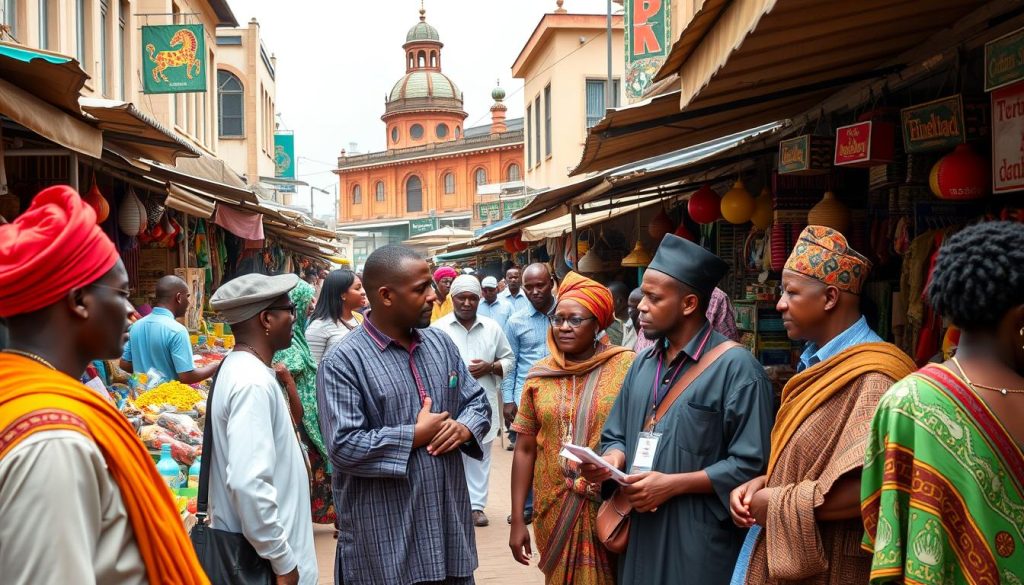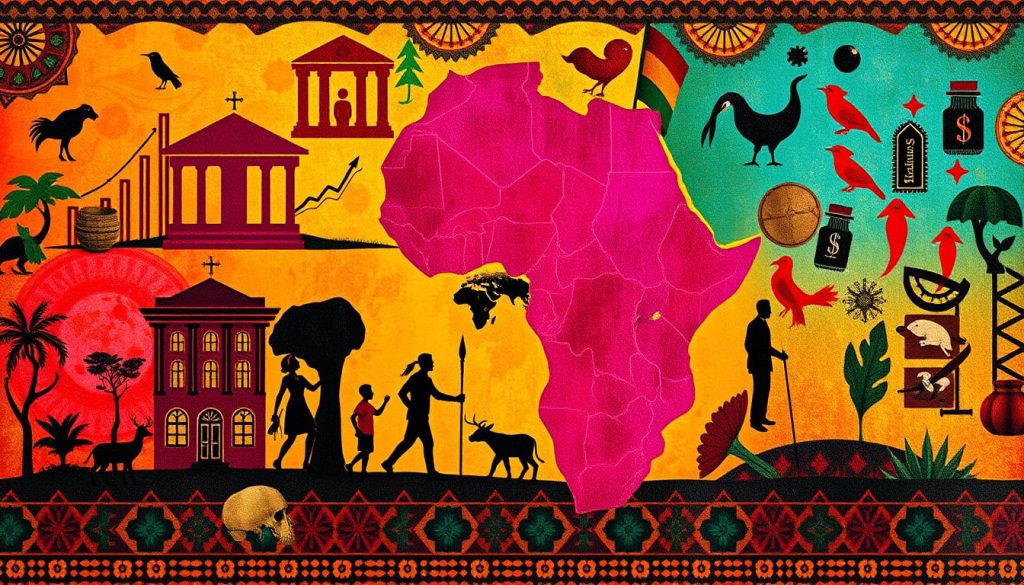UK businesses are now focusing more on expanding globally, and Africa is a key area of interest. The African market is full of potential, thanks to its vibrant economy and vast resources. Yet, it’s not without its challenges. To succeed, you need to grasp the cultural, legal, and economic differences from the UK.
This guide aims to offer valuable advice, strategies, and practical tips. It’s designed to help you find and work with business partners in Africa effectively.
Understanding the African Business Landscape

The African business scene is complex but full of promise. The economy has grown well, with many chances for investment and partnership. Knowing the different areas of Africa is key to understanding business there.
With 54 countries, each has its own business style. Things like infrastructure, rules, and economic stability are important. For example, some places focus on tech, while others are into farming and green energy. Countries like Kenya and Nigeria lead in tech, thanks to the African Continental Free Trade Area (AfCFTA).
- Economic growth projections are optimism-driven, reflecting a strong recovery post-pandemic.
- Key sectors include technology, agriculture, and renewable energy, each offering unique advantages.
- Government initiatives aim to enhance trade facilitation and investment opportunities.
Getting to know the African economy helps businesses find the right opportunities. This way, they can meet their goals.
The Importance of Cultural Awareness

Doing business in Africa needs a deep understanding of cultural differences. These differences shape each market and affect how we negotiate. Knowing these customs helps build strong relationships, leading to successful partnerships.
Every African country has its own cultural twists that influence decisions. For example, some prefer indirect communication over directness. This changes how agreements are made and kept. Knowing this helps avoid misunderstandings that could harm business.
Studies like Hofstede’s cultural dimensions theory show how culture impacts business. UK businesses in Africa also share their experiences. They show the need to adapt to local ways. Getting advice from groups like the British Council is also key to successful interactions.
How to Find Business Partners in Africa

Finding the right business partners in Africa begins with knowing the key industries. These sectors offer the best opportunities. By understanding these areas, businesses can match their products with what locals want.
Industries like agriculture, technology, telecommunications, and renewable energy are booming. They show a lot of potential for growth.
Identifying Key Industries
To find the right industries, you need to do a lot of market research. This helps spot areas ready for investment. Here are some top sectors:
- Agriculture: Africa’s varied climate makes this sector very active and innovative.
- Technology: Fast progress in mobile tech has changed how people shop and get services.
- Telecommunications: This sector is growing fast, connecting people and boosting the economy.
- Renewable Energy: It’s becoming more popular, thanks to Africa’s rich natural resources.
Investment trends are moving towards these areas. This is because of changing consumer needs and the competitive market. McKinsey & Company, the African Development Bank, and Deloitte all highlight the value of these insights for finding good partnerships.
Researching Market Dynamics
It’s important to understand the market well. This means looking at:
- Demographics: Knowing the age and growth of the population helps with marketing.
- Purchasing Power: Economic conditions affect how much people can spend and what they buy.
- Preferences: Cultural differences help tailor services to meet local needs.
Using tools and reports from Statista, PwC, and local business groups is helpful. They provide the data needed to navigate the competitive landscape. This helps UK businesses make smart choices when entering or growing in African markets.
Networking Opportunities in Africa

For UK businesses looking to enter Africa, making strong connections is key. Networking events are essential for building these ties. They help through industry conferences and trade shows. Here, businesses can meet others, learn about local markets, and find new partners.
Industry Conferences and Trade Shows
Events like Africa Trade Week and the Nigeria International Trade Fair are great for networking. They offer UK businesses a chance to:
- Meet influential leaders and stakeholders from various industries
- Gain first-hand knowledge about market trends and consumer behaviour
- Explore collaborative opportunities with potential partners
Being part of these trade shows boosts a business’s visibility. It also helps in building strong professional relationships. These events are not just for sharing ideas. They also help in forming close ties with local businesses, crucial for success.
Leveraging Online Platforms for Connections

In today’s digital world, online networking is key for UK businesses to find partners in Africa. Sites like LinkedIn are vital for this. They help connect with local entrepreneurs and leaders, boosting visibility and building relationships.
Social Media Professional Networking
LinkedIn is a powerful tool for networking in Africa. It lets businesses connect with content that matters in the African market. By joining in discussions and sharing knowledge, they can become leaders in their field. This approach not only increases visibility but also leads to deeper connections.
Job Portals and Business Platforms
Job portals and business sites are great for finding partners. Sites like Jobberman and MyJobMag help find talent and potential partners. They give insights into the local market, helping businesses find local expertise and grow their networks.
Collaborating with Local Business Brokers

Working with local business brokers can really help find the right partners in Africa. They know the local scene well, which is key in a complex business world. Their knowledge of the area helps businesses understand the market, laws, and culture.
There are many benefits to teaming up with business brokers:
- Access to a Network: Local brokers have connections that make it easier to find and partner with others.
- Regulatory Guidance: They help businesses follow local laws, avoiding legal problems.
- Market Insights: Brokers share their research on market trends, helping businesses make smart choices.
Using business brokers can make entering African markets easier. It leads to strong, lasting partnerships that succeed in the local environment.
Establishing Trust and Rapport

Building trust is key for success in African business. It takes hard work and understanding the local scene. Long-term partnerships grow from clear communication, shared values, and respect for cultures.
Building Long-Term Relationships
Regular chats are vital for lasting bonds. Meet in person and keep in touch with updates. Here are some tips:
- Open talks build trust.
- Be reliable by keeping promises.
- Join local events to deepen connections.
- Focus on common goals and benefits.
Knowing the value of good relationships can boost your partnerships. Strong ties and respect lead to successful collaborations.
Navigating Business Etiquette
Knowing the right business manners is crucial with African partners. It’s important to understand how to communicate and negotiate well. Each area has its own rules, so learning local customs is essential. Here are some points to remember:
- Learn proper greetings and introductions.
- Respect personal space and body language.
- Build rapport before starting talks.
- Adjust to the level of formality in talks.
Being aware of these points helps in managing relationships better. It also improves your chances of success in diverse business settings.
Legal Considerations for Partnerships

Starting partnerships in Africa means you need to know the local laws well. Each country has its own rules for businesses. It’s key for foreign companies to learn these laws.
They should look at partnership agreements and follow local rules. These rules can change how the partnership works.
A good partnership agreement is essential. It should cover roles, duties, and how profits are shared. This makes things clear from the start.
Getting help from a local lawyer is very helpful. They know the local laws well and can guide you. This can avoid problems and disputes.
It’s also important to know about trade barriers and rules in new markets. Knowing these can help your partnership succeed. Getting advice from legal firms and the UK Department for International Trade can help a lot.
Evaluating Potential Business Partners

It’s vital to do a deep check on potential partners for a successful business tie-up. Things like financial health, reputation, and cultural match are key. They help make sure the partnership fits with your company’s values and aims.
Doing due diligence is a must in this process. It means a detailed look at the partner’s past, money situation, and how they operate. This step helps lower risks when starting new partnerships.
- Financial analysis to check if they’re profitable and have enough cash.
- Looking at their reputation through what others say and feedback.
- Checking if their culture and values match yours.
It’s also important to assess the risks involved. This helps spot any possible problems or chances that might come up. By tackling these early, you can build a stronger and more fruitful partnership.
In short, focusing on evaluating partners, doing due diligence, and managing risks makes partnerships better. It also helps your business grow and succeed in the competitive world of partnerships.
Funding and Investment Opportunities in Africa

Africa is a unique place for businesses looking for funding and investment. The continent is growing fast, thanks to a young population and more technology use. Venture capital and private equity are now more common, showing the potential of African markets.
The World Bank is a big player in funding African projects. They focus on infrastructure and development. This means businesses can get a lot of financial help.
The African Development Bank also has funding programs for growth. These programs help both local and foreign investors. They drive sustainable development in the region.
- Venture capital funds are emerging, capitalising on innovative start-ups across sectors such as technology, health, and agriculture.
- The African private equity market has garnered attention for its ability to deliver high returns while fostering economic development, as analysed by PwC.
- Government grants and incentives further support local businesses, making Africa an appealing destination for investment.
Knowing about different funding sources helps in understanding African markets better. Smart investors can find opportunities that match their goals. This leads to strong partnerships and long-term growth.
Success Stories of UK Businesses in Africa
Many UK businesses have made it big in Africa. They show how smart strategies and local knowledge can lead to success. For example, a British renewable energy company grew in Kenya. They brought in green technologies that met local needs and boosted their global image.
These stories prove that UK firms can not only do well but also lead in Africa. They show the power of the right approach.
The African Business Magazine shares many stories of business wins across the continent. One story is about a UK agricultural company teaming up to tackle food security in Ghana. They used new farming methods and worked with local farmers to increase crops and profits.
These stories are great lessons for businesses looking to start. They show the challenges and rewards of doing business in Africa.
UK companies already in Africa share their experiences. They stress the need for strong local ties and understanding local cultures. These are key to lasting success in Africa.
These stories inspire new businesses to take on the African market. They show the great opportunities waiting for those ready to dive in.
















